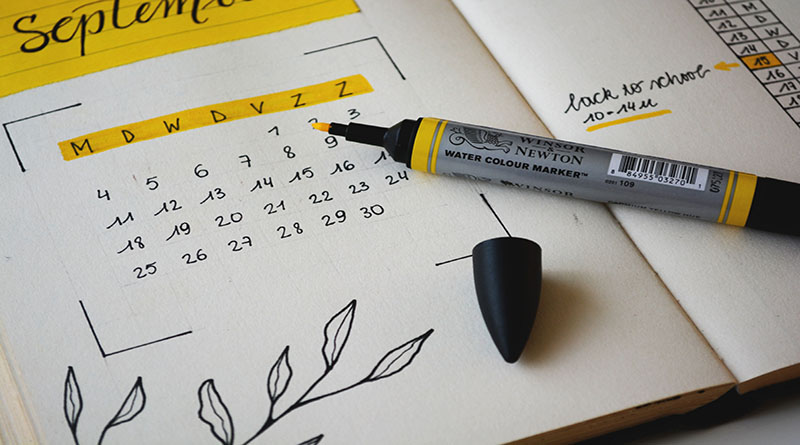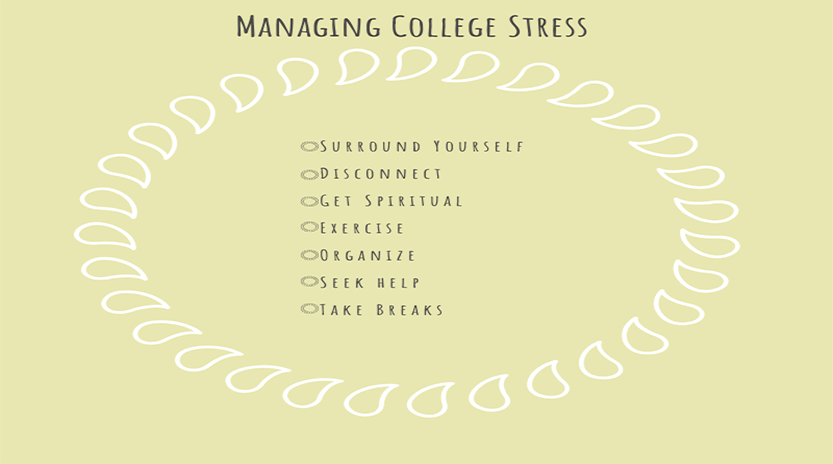By Taylor Dowd
Since early fall, you’ve felt stressed, sleep deprived, overwhelmed and a bit disorganized. Maybe you’ve spent all of your free time in office hours to no avail, or your 21-credit “light-load” semester finally got the best of you. Sound like you? You’re probably a stressed out college student. Whatever your reason for stress, it doesn’t have to completely exterminate all joy from the school year. Making small changes can lead to big results. Tackling stress as a college student is no easy feat, but it is possible. Here are seven tips to manage stress this semester:
Surround yourself with other people
Joining clubs, being involved in school activities, and being around friends allows time for social connection and feeling supported. “Isolation can encourage rumination and lead to stress,” Kieran Michael of Western Connecticut State University’s counselor education program says. “It can help to be around other people in order to prevent or lessen stress.”
Set that phone (or laptop or tablet) aside
College students spend alarmingly high amounts of time on their phones, nearly 4.5 hours daily, according to a study conducted by “The Post,” Ohio State University’s newspaper. Technology has altered the dynamic of human interaction, often in damaging ways. “I’m a big believer that technological advances are contributing in an adverse way to the mental health problem,” SUNY New Paltz professor of psychology and author of “Positive Evolutionary Psychology” Glenn Geher says. Spend time away from your phone and you may find stress levels reduced.
Tap into your spiritual side
For those who practice, leaning on others in religious or spiritual groups provides the sense of community necessary for social success. Geher asserts religion and spirituality are, for many, “part of our evolutionary heritage to keep us connected to others and to this idea of something bigger.” Prayer, meditation, and reading can be ways to relieve tension and feel at peace.
The tip you didn’t want to read: Exercise
But really, it works. The American Heart Association recommends a minimum of 150 minutes of moderate-intensity weekly exercise. In addition to contributing to “better sleep, memory, balance and cognitive ability,” it can lower the risk of chronic disease and depression. Exercise is highly individualized and most enjoyable when adjusted to fit personal interest. If intense cardio isn’t quite your thing, try weight training or yoga. Simply stretching on a daily basis can physically relieve tension in areas where stress settles, like the neck, shoulders, and back.

Organize
“Having order in some small area, even if it’s just your desk can be effective,” Michael says. Organization can help clear the mind and decluttering a physical space makes for a less stressful work environment.
Seek help if you need it
There’s absolutely no shame in speaking to a professional if your situation requires it. Most college campuses offer counseling services to students, but speaking to a teacher or faculty member is a good first step. Geher takes notice when students stop attending class or he sees a student requires redirecting to professional help. “Best practice is encouraging [students] to go to the counseling center,” he says.
Take breaks from work
“Set aside a fixed period of time during which you can relax, unwind and let your mind wander before returning to your responsibilities,” Michael says. Breaks help increase productivity, motivation and ultimately make a project or assignment more manageable.

Stress is an inevitable part of life, especially for a college student, but it doesn’t have to be completely unfixable. By implementing healthy lifestyle choices and adhering to these tips, a more stress-free semester becomes achievable.
Check out more interesting tutorials about living in college here.
Nadine Cafaro shares how ceramics can be a one time try or become the perfect hobby if you’re looking for something easy and affordable.
Annemarie Durkin offers advice about how to find the major that is just right for you.
Joseph Juste explores an alternate career path and how to become your own boss.
Devon DeGroat gives us some helpful tips on how to eat healthy while away at college.
Kelsey Fredricks points out a few ways to kickstart your career while still in college.
Nikki Donohue shares how easy and important it is to become a politically active college student.
Emily Harter gets real about how to get the three P’s: the perfect pregame playlist.
Emily Fego shows the benefits of mindful eating when you go away to school.
Brandon Whiting shows how easy and accessible studying abroad actually is.
Brian Rice offers some great information about why you should be avoiding all-nighters.
Jake Mauriello offers tips to help stay organized in school.
